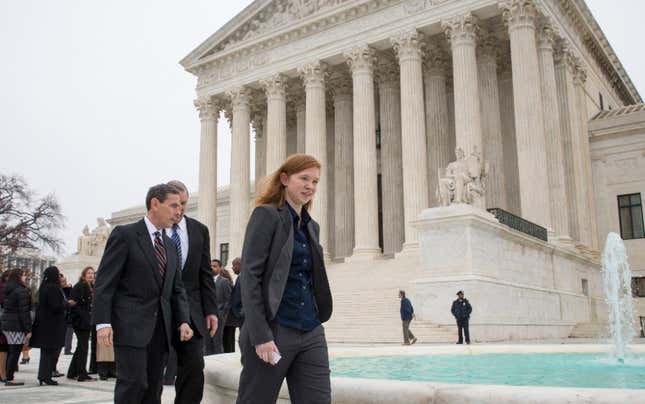
Students For Fair Admissions—the crusaders for white opportunity in a country built on the American dream of opportunity exclusively for white people—is continuing its fight against affirmative action in college admissions with hopes that the Supreme Court is finally conservative and Trump-supporter-y enough to hand them a victory after a string of court losses.
From Politico:
Legal strategist Edward Blum’s group, which represents about 23,000 students, argues that policies common at U.S. universities put white and Asian American students at a disadvantage. The Supreme Court has allowed colleges to narrowly use race in admissions for decades, but Blum’s group argued in a case against the University of North Carolina at Chapel Hill in November that its race-conscious admissions policy “cynically focuses on diversity at the most superficial level,” “gives substantial preferences” to some minorities and “uses race in a mechanical, formulaic way.”
“The easiest part of my job as president of Students For Fair Admissions is to convince the majority Americans that the use of race and ethnicity in college admissions is unfair,” Blum said in an interview, noting a 2019 Pew Research survey on college admissions that found 73 percent of Americans “say colleges and universities should not consider race or ethnicity when making decisions about student admissions.”
One thing that should be noted about Blum: The first time many people heard his name it was because he represented Abigail Fisher—your average white person’s favorite average white person—who claimed that she was denied entry to the University of Texas because she’s white, only to have it revealed that only 47 students who were admitted to UT the year she applied had lower grades than her and, out of those applicants, 42 were just as white as she is.
In other words: Blum chose a mediocre white person as the poster child in proving students of color get a leg up in college admissions at the expense of white people who just want to be great (even though they so obviously aren’t).
Of course, to let Blum tell it, cancel culture is what led to Fisher’s loss, not the fact that she’s as basic as PlayStation 2 graphics look in 2020. So he decided not to use students as the faces of his lawsuits anymore.
“In a world in which social media can cancel the life prospects of a student, it is unwise to bring a lawsuit like this with a group of young people whose social reputation and physical safety may be in jeopardy if their identities are revealed,” Blum said, Politico reports.
Blum—along with the SFFA, aka The Legion of Doom and White Tears (arch-nemesis of the Justice League of Affirmative Action)—also ignores all the research that shows white women, like Fisher, are the biggest beneficiaries of affirmative action.
In fact, The Root has done plenty of reporting that details how white people are and have always been the biggest perpetrators of reverse-affirmative action (if “reverse-racism” is a thing, so is this) in America.
So basically, one survey from Pew-and-them doesn’t prove the existence of leprechauns, unicorns or the equally fictitious anti-white discrimination in America.
Unfortunately, that doesn’t mean the SFFA won’t finally get its win.
More from Politico:
With an evolved legal approach, the backing of the Trump administration and a newly cemented conservative majority on the Supreme Court bench, Blum may finally have the pieces he needs to push the court to ban the use of race in admissions altogether.
How all of this shakes out could change the way colleges evaluate applicants.
Colleges may be forced to remove students’ names and race and ethnicity checkboxes from their application, and abandon their traditional holistic admissions practices. Education and civil rights groups fear that race-neutral admissions policies will exacerbate inequality for students of color for years to come. A race-blind admissions standard, they say, fails to take into account discrimination and barriers students of color often face.
“SFFA’s chief goal—I mean, it’s obvious—they want to eliminate the consideration of race all together,” David Hinojosa, director of the Educational Opportunities Project at the Lawyers’ Committee for Civil Rights, said. “They know what the Supreme Court precedent says yes, you can consider race by meeting the strict scrutiny standards, but they’re just seeking an activist U.S. Supreme Court that will revisit this and reverse the precedent that we have had for the last 40-plus years.”

